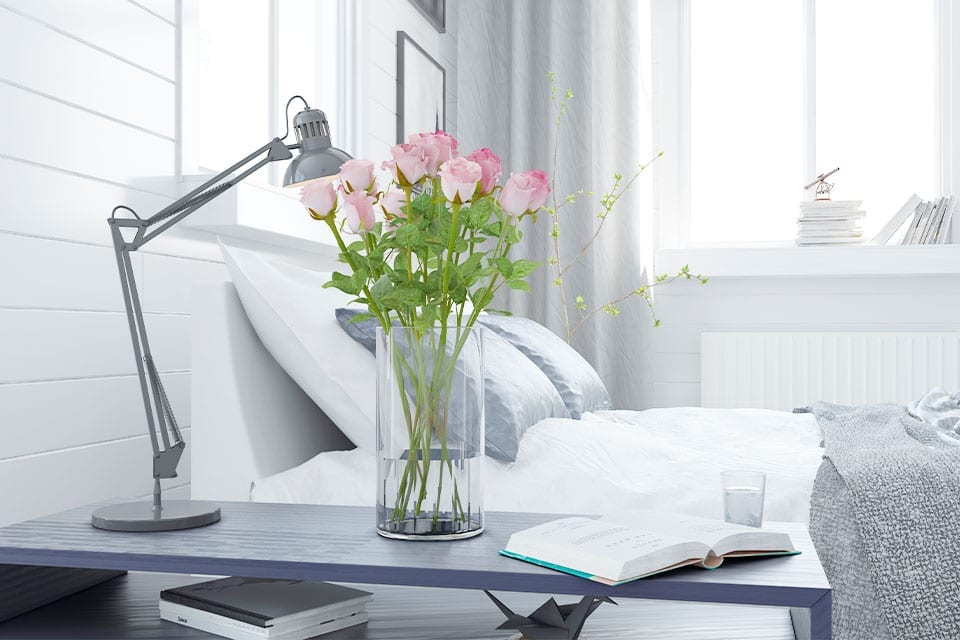If you follow the guidelines spelled out in an Energy Star report, you are probably much warmer than you should be to sleep well. With a recommended 82-degree thermostat setting at bedtime, the guidelines grabbed media attention and sparked viral internet outrage. (Energy Star is a government-backed organization that focuses on energy efficiency. The report offered a chart of efficient thermostat settings.)
Eighty-two degrees at bedtime? As you can imagine, the comments and memes in response to that report expressed shock, anger and prompted some wry humor about sweaty nights, saunas and heatstroke. Let’s face it, an 82-degree room just doesn’t offer a comfortable sleep.
So how warm or cool does your bedroom need to be for you to get restorative sleep? Dr. Michael Breus, the Sleep Doctor, recommends a sleeping room temperature of 65 degrees. That will help boost your body’s natural cooling down process that begins in the late afternoon and continues through the evening.
This cooling process is in sync with your 24-hour circadian rhythm. This rhythm regulates your sleep-wake cycle. Your body naturally knows when it should be asleep or awake. What you do before sleep, how long you sleep, and even the temperature of your room can either help or hinder this crucial restorative process.
There is one other internal biological mechanism that helps regulate your sleep-wake cycle. It’s called sleep-wake homeostasis. This is basically a drive that compels us to sleep after a certain period of time. This drive increases the longer you are awake and also affects how deeply you sleep. That’s why you tend to sleep for more hours and more deeply after being sleep deprived.
You might be wondering what real difference, if any, a warmer room or cooler room can have on your quality of sleep and on your overall health. Why is good sleep important? When you sleep, you go into repair mode where your body and brain are replenished and healed.
Good sleep boosts your immune system, improves brain function and emotional health, helps balance hormone levels, and helps control obesity and heart disease. Lack of sleep has the opposite effect. And chronic lack of sleep can cause irreparable damage to your mind and body.
There is not one system in your body that isn’t affected by sleep or a lack of it.
So just how important is room temperature to this wonderful, restorative process that helps us slow the aging process and live more fully and comfortably?
Research reveals several negative effects on sleep quality and overall health when your room is too warm.
One study found a negative effect on sleep efficiency when the room temperature was too high. Your core temperature naturally decreases when it’s time to sleep, and your room temperature needs to be low to facilitate heat loss. Warmer temperatures and higher humidity have been shown to suppress this decrease in core temperature. Humid heat exposure also increases wakefulness and decreases REM sleep.
In the sleep cycle, REM sleep (Rapid Eye Movement sleep) is characterized by vivid dreaming because the brain is more active during this sleep stage. We all go in and out of these REM stages of sleep throughout the night. REM sleep stimulates the areas of the brain that we use to learn new things. About 20 percent of an adult’s sleep is REM sleep. For babies, that can be as much as 50%. You can find out more about sleep stages and how to get more deep sleep here.
While Dr. Breus recommends sleeping in a 65-degree room, the National Sleep Foundation (NSF) suggests a range between 60 and 67 degrees. The NSF also points out that sleeping in a room colder than this advised range can also be detrimental to your sleep quality. Some research suggests negative effects if you’re either too cold or too hot.
Room temperature is only one factor that affects sleep quality and, ultimately, your overall health. Earlier, I mentioned your circadian rhythm. I want to share more with you about this important inherent rhythm that you need to keep in sync to keep you out of trouble.
As Dr. Felice Gersh explained to me in a fascinating interview, our bodies naturally try to stay synced with the 24-hour cycle of the earth. But many of us have changed that beat and have suffered ill health effects as a result.
Did you know one-third of all the genes in our bodies are clock genes and all our other genes work in synergy with them? When we don’t live according to our clock, we suffer metabolic distress, liver dysfunction, insulin resistance, unhealthy fat production and more.
Circadian dysfunction also increases growth factors in your body. Chronic high levels of growth factors, coupled with inflammation, are associated with the potential for cancer.
Dr. Gersh also shares the benefits of fasting as it relates to your circadian rhythm. She shares how fasting triggers our amazing cellular renewal process called autophagy and prompts the regeneration of stem cells. This renewal and regeneration process can occur more quickly at night while you are sleeping.
There are so many great reasons to pay attention to your sleep schedule and make sure you are honoring those rhythms that restore you. Your body is working hard while you sleep to make you the best version of yourself that you can be. When you sleep deeply and comfortably in a cool, dark and quiet room, you’re giving your cells what they need to do their jobs. You are getting your “beauty sleep” on the inside and that will ultimately show on the outside as well.





